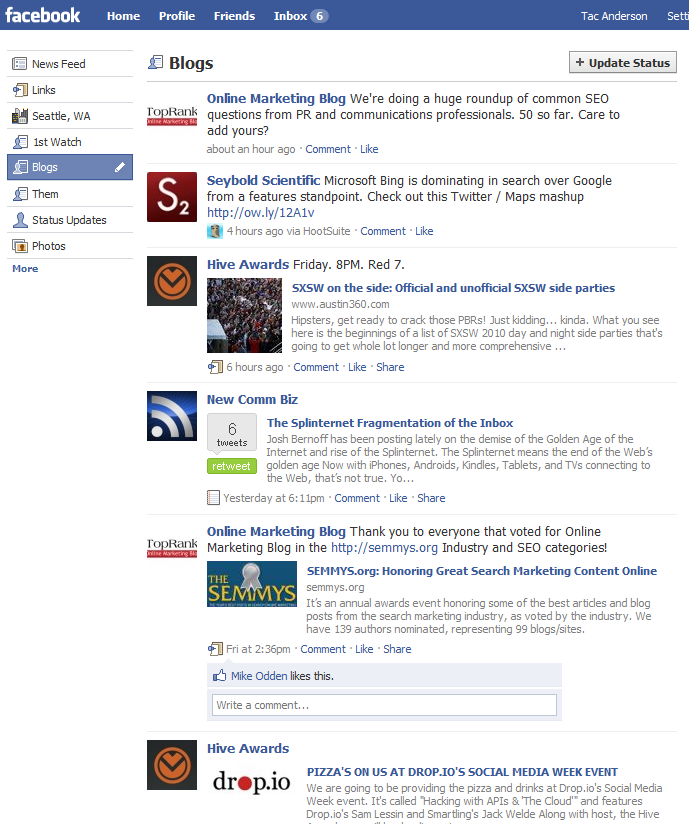I’ve been playing around with Facebook. Both how to promote brands on Facebook as well as how users consume content within the walled garden (hint: there’s a direct correlation between the two).
As blogs and media networks extend their reach using Facebook Pages, I noticed something interesting:
Facebook can be used as an RSS reader.
Most people don’t use the groups feature enough but it’s just like using Twitter lists, except you can’t share them. I’ve set up one just for the blogs I follow on Facebook.
It’s like a more graphical version of Google Reader with the shared and comments view shown in the collapsed mode.From here users can like or comment on any post or click through to the expanded “notes” view.
Facebook is a growing source of news for most people. While the geeks among us may still prefer RSS or Twitter your average user will follow a fan page before they subscribe to an RSS feed. I’ve written about a study showing that Facebook members use the social network as a growing source of tech news.
(BTW, feel free to join the New Comm Biz Facebook Page.)
Over on the Facebook blog, Malorie Lucich, has a post about how she’s seeing the rise of Facebook as a news source Creating Your Personalized News Channel.
When the earthquake hit Haiti, victims in the area, news affiliates and people around the world used Facebook to learn what was happening, connect with loved ones and quickly disseminate information. ABCNews.com and France 24 added Facebook live stream boxes to their sites to enable people to share their feelings on the disaster and relief efforts, and publish it back to their Facebook status. Meanwhile, The New York Times created a special Facebook Page dedicated to Haiti coverage, resources and updates from their reporters on the ground.
Malorie then recommends building a group of just the news sources you follow to clear the clutter. The next step in Facebook’s twitterfication will be to make these lists shareable. Facebook could also further this adoption by mimicking Twitter’s now dead, Suggested User List and have a recommended group that people could follow or even recommended groups by category. Companies would pay millions for that kind of reach.
As this kind of use on Facebook grows your Facebook fan numbers could easily eclipse your RSS subscriber numbers. This also poses an interesting challenge for publishers hiding their content behind pay wall or a unique partnership opportunity, depending on how they approach it.
Update: Marshall Kirkpatrick just posted a very similar post on ReadWriteWeb:
Facebook Could Become World’s Leading News Reader (Sorry Google)
Services like MyYahoo and iGoogle saw some traction and many readers here may have a Google Reader account, but dedicated RSS (really simple syndication) feed reading services have never lived up to their potential to become a mainstream phenomenon. These days many people say they just wait until links get shared on Twitter and they never use a feed reader at all. Late last week Facebook threw its hat in the ring and called on users to use its service as a news feed reader. There are a number of reasons why Facebook could be the strongest online subscription option yet.
Join the New Comm Biz Facebook Page or follow the Twitter account.
Similar Posts:
- Google Reader Notes helps FriendFeed hurts del.icio.us and Twitter
- The Total Reset Experiment: Week 1 - You Need To Blog More!
- Why it takes me so long to add Twitter Friends
# of Comments 5
# of Comments 3
# of Comments 4
